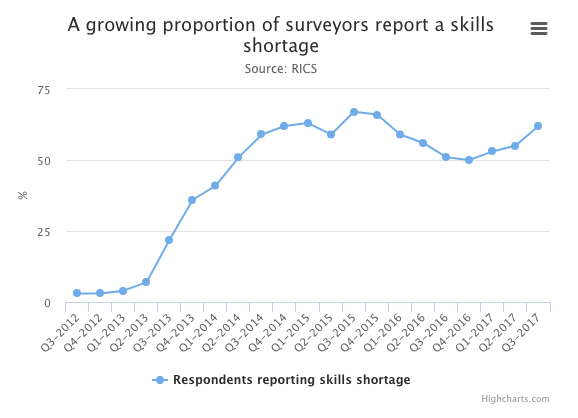Britain’s shortage of surveyors, bricklayers and other construction workers is holding back building work just at the time when the country needs more houses and infrastructure.
Almost two-thirds of surveyors said a lack of skilled workers is a key factor limiting building activity, according to the Royal Institute of Chartered Surveyors.
The skills shortage has now overtaken planning and regulation as the second biggest problem facing the industry, with 62pc reporting recruitment problems in the third quarter of the year.
This is the highest proportion in two years and one of the highest scores on record.
On average over the survey’s five-year history only 40pc have reported a lack of skilled workers is holding back business, so the rise to 62pc is a significant intensification.
The only bigger impediment is a lack of access to finance which was reported as a difficulty by 69pc of surveyors, a sharp fall from 79pc in the second quarter of 2017.
The construction sector is growing – the proportion of surveyors reporting higher demand on the quarter outweighed those reporting a fall by a margin of 22pc.
The industry also expects profit margins, workloads and employment to rise over the next year, though at a slower pace than in the years from 2013 to 2015.
“While activity in the sector has moderated, growth and growth expectations remain in positive territory,” said RICS’s senior economist Jeffrey Matsu.
“Uncertainties due to Brexit continue to weigh on companies’ investment and hiring decisions, and banks appear to be adopting a more cautious stance to providing finance. Meanwhile, challenges related to an inadequate supply of skilled labour are as pronounced as ever.”
The struggle to find workers comes at a time of record low unemployment.
The jobless rate is 4.3pc, according to the Office for National Statistics, the lowest since 1975.
Over the 12 months from June 2016 to June 2017 employment in the construction sector rose by 45,000 people to 2.9m.
Average earnings in the industry increased by 2.1pc over the 12 months to September, close to the average of 2.2pc across the whole UK economy.
Courtesy TheTelegragh







